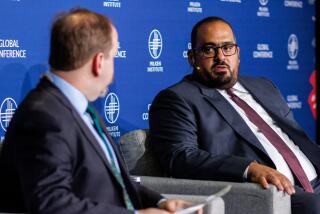The Troubling Saudi Factor
The discovery that 15 of the 19 hijackers Sept. 11 were Saudi Arabian was a shock to Americans who had seen the kingdom as a solid ally despite its deep cultural differences with the United States. The alliance remained after 9/11, but the U.S. view of the Saudis began to shift. This weekâs disclosure that a briefing for a Pentagon advisory board called the kingdom an adversary of the United States and a backer of terrorism strains the ties even more. The Bush administration hurried to distance itself from the comments and reassure the Saudis. But that doesnât mean either nation can entirely dismiss the harsh views in the briefing, given by a Rand Corp. analyst.
The analyst, Laurent Murawiec, told the civilian Defense Policy Board that âSaudi Arabia supports our enemies and attacks our alliesâ and is âthe kernel of evil, the prime mover, the most dangerous opponentâ in the Mideast. Those statements are 180 degrees from the long-standing policy of the U.S. government, but they do reflect the beliefs of a number of influential conservatives. The Defense Policy Board, which advises the Defense Department, consists of former government officials including Henry A. Kissinger, who, according to the Washington Post, disagreed with the analysis. The briefing said that if the Saudis did not do more to crack down on terrorism, their oil fields and overseas financial assets should be âtargeted.â What that would amount to was not specified.
A Western diplomat in Saudi Arabia said recently that both Riyadh and Washington had high-level diplomats trying to hold the relationship together at a troubling time. The diplomat acknowledged that there was some âcultish feelingâ among Saudis for Osama bin Laden as a man who forsook vast wealth to fight Soviet invaders in Afghanistan. The envoy also said the Saudi government, which stripped Bin Laden of his citizenship several years before the attack on the World Trade Center, had tried to preach a message of âtolerance and moderationâ to its subjects since Sept. 11. That message needs much repeating.
The Saudi government views itself not just as a civil authority but as a custodian of the holy places of Islam, the religion that began on the Arabian peninsula. There are different brands of Islam just as there are different branches of Christianity. The Wahhabi school of Islam, which dominates Saudi Arabia and arose there, is the most conservative and the one often taught abroad in Islamic schools financed by the Saudis. In countries such as Malaysia and Turkey, a more moderate form of Islam is practiced.
The United States should press for a reexamination of Saudi religious schools to ensure they are not nurturing future terrorism. Although it is wrong to blame Sept. 11 on religion, it is reasonable to ask why so many hijackers came from one country. Saudi leaders owe it to the 9/11 victims to seek answers instead of brushing aside that painful fact.
More to Read
Sign up for Essential California
The most important California stories and recommendations in your inbox every morning.
You may occasionally receive promotional content from the Los Angeles Times.










